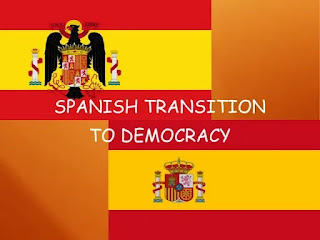On 27 May 2025, European Studies Centre at St Antony’s College, Oxford University, hosted a seminar chaired by Ainhoa Campos Posada, Ramón Areces Visiting Fellow at St Antony’s. The event brought together Alba Nueda Lozano of the Universidad de Castilla-La Mancha; Sophie Baby, Senior Lecturer in Contemporary History at Université Bourgogne Europe; and Magda Fytili, Ramón y Cajal Postdoctoral Researcher at the Universidad Complutense de Madrid. Each speaker challenged conventional wisdom about Spain’s passage from dictatorship to democracy, illuminating overlooked dimensions of violence, gender, and regional disparity.
Sophie Baby began by dismantling the myth of a peaceful transition. She reminded attendees that between 1975 and 1982—often held up as Spain’s “exit from violence”—there were at least 714 deaths and over 3,200 recorded violent actions. Far from a simple departure from authoritarianism, Baby showed how Spain inherited and perpetuated interlocking cycles of violence: revolutionary groups such as FRAP and GRAPO clashed with far-right militants like Guerrilleros de Cristo Rey, while the state itself was responsible for nearly 180 deaths through police operations and extrajudicial “dirty war” tactics. The Basque conflict, she argued, cast the longest shadow: ETA’s campaign left over 800 dead, provoking counter-terrorism measures (Triple A, BVE, GAL) that blurred the line between law enforcement and political repression. Baby concluded that this sanguinary backdrop calls for a re-evaluation of human-rights legacies: unlike Latin America, Spain’s victim-rights movement emerged unevenly, propelled more by the long-running Basque struggle than by civil-war memory.Magda Fytili then turned to women’s agency in the transition. She introduced “maternal activism” as a framework for understanding how housewives and mothers—socially confined under Franco as legal minors—mobilised their gendered identities to demand political change. From 1960s market-stall protests by the Movimiento Democrático de Mujeres to the landmark 1975 Women’s Liberation Conference convened in the wake of Franco’s death and the UN’s International Women’s Year, mothers linked personal grievances to collective claims: equal pay, maternity leave, childcare provision, and reproductive rights. Fytili showed how feminists drafted constitutional gender clauses, organised mass self-incrimination campaigns (“I have also aborted”), and secured legal reforms on divorce and labour discrimination by framing their demands in ethics of care. In doing so, they transformed domestic roles into a potent form of political consciousness and laid the groundwork for Spain’s later feminist movements.
Alba Nueda Lozano concluded the presentations by telling “the other transition” of inland Spain. Departing from metropolitan narratives centred on Madrid and Barcelona, she investigated Castilla-La Mancha, Extremadura and Aragón—regions marked by high illiteracy, Francoist hold-overs and economic dependency on agriculture. In rural provinces like Cuenca and Guadalajara, Franco-era mayors were re-elected in 1979, while Toledo’s conservative archbishop faced grassroots parish activists demanding social services. Ciudad Real witnessed union-led protests over mechanisation and unemployment, and in Albacete a far-right bombing of a popular bookstore in 1979 underscored how cultural freedom remained under assault. Nueda Lozano stressed that these interior territories experienced transition as a “democracy imposed from above,” with weak regional institutions and uneven mobilisation. In Extremadura, land occupations in 1976 revealed demands for structural reform beyond mere electoral change; in Teruel, civic campaigns for basic infrastructure demonstrated a “democracy without development.” Her account emphasises that Spain’s transition cannot be fully understood without acknowledging its fragmented geographies and the resilience of local communities.
During the Q&A, panellists addressed parallels with Portuguese and Greek transitions, the continuing effects of ETA’s violence, and debates over when Spain’s transition truly ended—whether with the final statute of autonomy, the consolidation of political parties, or the broader entrenchment of liberal democracy. Sophie Baby suggested that different metrics (institutional, social or legal) yield different end-dates, while Magda Fytili and Alba Nueda Lozano emphasised the enduring legacies of regional memory and gendered activism. Across these exchanges, the seminar underscored a central lesson: Spain’s path to democracy was neither uniform nor bloodless, but a complex tapestry woven from competing violences, gendered struggles, and uneven regional transformations. Only by embracing this complexity, the speakers agreed, can we achieve a more comprehensive understanding of one of modern Europe’s defining political transitions.

No comments:
Post a Comment